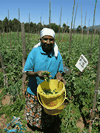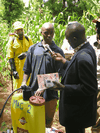Fair miles are far better

Food miles campaigns that try to steer consumers away from third world produce are aiming at the wrong target, argues Suzie Emmett
Local food is miles better. But better for whom, exactly? Bang on, if you must, about the superiority of British-grown produce and how UK farmers must be supported.
But oversimplifying the food miles debate to discriminate against developing country farmers is at best naïve. At worst, it is becoming a poor and over-used excuse for self-interest and misguided protectionism.
The perfect snow peas, mange tout, and fine beans on offer on shop shelves here in the UK are the new engine for rural economic growth in Kenya. Economic analysts will tell you that the export horticulture business in developing countries reaches the parts that other trade or aid initiatives cannot reach.
The careful attention to detail required to produce such perfection means most of these crops are grown by small out-growers, not large farms. A million new livelihoods have been created and related employment provided for three million more. Surely they should not be denied this opportunity?
In the fertile foothills of the Aberdare ranges and on the slopes of Mount Kenya, news of how campaigns on food miles are being used to dissuade shoppers from buying air-freighted fresh vegetables is met with dismay.
Small-scale farmers have spent years investing time, effort and money in meeting – and even superseding – retailer specifications like Nature’s Choice and Field to Fork.
To say Kenyan farms are not run to as high standards as in Britain is ludicrous. The construction of chemical stores and grading sheds, systems of record-keeping and adhering to precise protocols of production with passion and professionalism means their produce is as safe, traceable and nutritious as any UK crop.
It’s rich, frankly, to use climate change concerns to hit developing country farmers whose lifestyle and livelihoods – not to mention their production methods – emit a tiny fraction of the pollution pumped out in the UK.
And whatever global warming brings, it is likely that Kenyan farmers will be affected far more and sooner than farmers in temperate regions.
The claim that “it would be better if they grew food to feed Kenyans” doesn’t take much demolishing, either. Many farms – often less than an acre – already grow more than a dozen crops and export plots are rotated with carrots, cabbages, maize and potatoes that are all for Kenyan consumption.
Time and again farmers explain that export crop income pays for education, healthcare and investment in further development of the farm.
Despite the differences, farmers in the UK and Kenya have a lot in common. Both sell to the same supermarkets. Both know all about the incessant push for highest quality for least cost.
Leafing through Farmers Weekly, Kenyan farmers remark how they and their UK counterparts share the same priorities – to minimise costs and losses to pests while maintaining quality. But when it comes to having a grasp of the international dimensions to the food and farming business, the two countries are worlds apart.
So they jump at the chance to tell you what they think of Farmers Weekly’s simple ‘local food is miles better’ slogan. If you can’t take it from me then take it from them: fair miles are far better.
Here’s what they say:
 Russel Ng’ang’a, chairman of a group of 200 farmers growing mange tout and sugar snaps
Russel Ng’ang’a, chairman of a group of 200 farmers growing mange tout and sugar snaps
“I think the food miles campaign is very unfortunate. Think about the millions of small-scale farmers whose livelihood depends on the production of the peas and beans. In my view this issue of global warming has lots of angles to it. Something much more should be done to make sure that the emissions of carbon dioxide is reduced by other means than stopping sales of our produce.
For groups like ours – now certified to meet European standards – there has been a lot of training and we are monitored and audited to check we comply.
Initially, when we started out to meet the European standards, we believed it would mean that we would enjoy better prices and stability. Unfortunately that has not turned out to be the case and this has led to a lot of disillusionment. Something needs to be done.
If the costs of production have to rise to meet everything that buyers want and consumers expect then more money has to trickle back to the producer.”
Lydia Njuguna, senior agronomist with Kenya Horticultural Development Programme
“What do Europeans want? To see us all stay in poverty? To come to Europe looking for jobs? I don’t think so.
Because the beans and snowpeas we export to Europe are high value the farmers can at last earn more and be able to invest in better lives and further developments. It’s important that we get away from just subsistence agriculture.”
 Virginia Wanjiru, mange tout farmer at Kinangop
Virginia Wanjiru, mange tout farmer at Kinangop
“Although I have reached an old age I have learned all about scouting my mange tout crop for pests and how to use the absolute minimum of chemicals to get the highest quality. I have built a good business out of this.
As a group of 200 farmers we have invested in our own grading shed and offices. Our community relies on us now. We hoped to go from strength to strength. We would like to sell local but the people who want this crop are far away.”
 Weldon Kirui, presenter at Kenya Broadcasting Corporation
Weldon Kirui, presenter at Kenya Broadcasting Corporation
“I present the national farming programme on radio and we have a weekly slot on the export crops and I have seen how hard the farmers work and the benefits they get.
They worked hard with the language and the techniques to do everything the European consumer wants and then now they have achieved it all, suddenly the consumer says that they are concerned about air freight.
Will they stop going on planes on holiday? Where is their heart?”
 Virginia Mwai , quality assurance and food safety, Kenyan Ministry of Agriculture
Virginia Mwai , quality assurance and food safety, Kenyan Ministry of Agriculture
“Our farming contributes very little to global warming. We use people to weed the fields.
We don’t use tractors to produce the food that is exported. I wonder whether stopping the export of our produce to Europe would stop the planes flying and whether that would really reduce the carbon emissions.”
 Edwin Muga , technical adviser for Kenya Horticultural Exporters
Edwin Muga , technical adviser for Kenya Horticultural Exporters
“Green beans have transformed the communities. Now the young people want to stay in farming because they can see that there is money and a future in it.
They can have smart phones and good clothes by living here, not in a city. I don’t understand – how could anyone want to take that chance away?”
Maina Kanene, green bean farmer
“Growing for export has taught me so much about good agricultural practice which I now put in use for all my crops. I am now being held up as an example in the community.
I grow better quality crops and my wife and I supervise very closely the use of fertilisers and pesticides. We use the money for both our children to be in primary school and to build our new home and put in electricity.”
